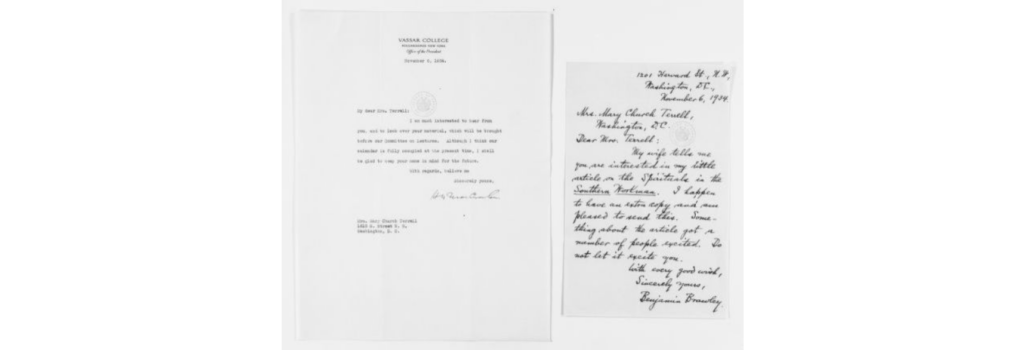African American History Month is an annual celebration of achievements by African Americans and a time for recognizing their central role in US history. Let’s dig in to some manuscripts written by African American authors. A manuscript is a written or typewritten composition or document as distinguished from a printed copy.
In his classic novel Native Son, Richard Wright tells the story of a poverty-stricken young black man who takes a job as a chauffeur to a white family in Chicago, accidentally kills the daughter, and tries to cover it up. For decades, the film version of “Native Son” didn’t tell the whole story—the result of censorship before its US release. The collection of the Library of Congress includes Wright’s original vision, both on film and paper, for future audiences. View the manuscript here.
As a lecturer, political activist, and educator, Mary Church Terrell dedicated her life to improving social conditions for African American women. The digital collections of the Library of Congress contain a wide variety of material associated with Terrell, including the Mary Church Terrell Papers from the Manuscript Division. Terrell helped to organize self-help programs promulgated by leaders such as Booker T. Washington to directing sit-down strikes and boycotts in defiance of Jim Crow discrimination. She aided in the founding of two of the most important black political action groups, the National Association of Colored Women (NACW) and the National Association for the Advancement of Colored People (NAACP). The Terrell Papers reflect all phases of her public career.
The Frederick Douglass Papers at the Library of Congress presents the papers of the nineteenth-century African American abolitionist who escaped from slavery and then risked his own freedom by becoming an outspoken antislavery lecturer, writer, and publisher. The online collection, containing approximately 7,400 items (38,000 images), spans the years 1841–1964, with the bulk of the material dating from 1862 to 1865. Many of Douglass’s earlier writings were destroyed when his house in Rochester, New York, burned in 1872. The
Speech, Article and Book File contains the writings of Douglass and his contemporaries in the abolitionist and women’s rights movements and includes autographed copies of editorials and opinion pieces from Douglass’ antislavery weekly,
North Star, and a partial handwritten draft of Douglass’s third autobiography,
The Life and Times of Frederick Douglass.
Today is also the celebrated birthday of Frederick Douglass. Although Douglass was born into bondage, and never knew his birthdate, he chose to celebrate every year on February 14th. Douglass Day is celebrated this day each year as a collective act of service for Black history.
Curious about the NCTE and Library of Congress connection? Through a grant announced recently by NCTE Executive Director Emily Kirkpatrick, NCTE is engaged in new ongoing work with the Library of Congress, and “will connect the ELA community with the Library of Congress to expand the use of primary sources in teaching.” Stay tuned for more throughout the year!
It is the policy of NCTE in all publications, including the Literacy & NCTE blog, to provide a forum for the open discussion of ideas concerning the content and the teaching of English and the language arts. Publicity accorded to any particular point of view does not imply endorsement by the Executive Committee, the Board of Directors, the staff, or the membership at large, except in announcements of policy, where such endorsement is clearly specified.

